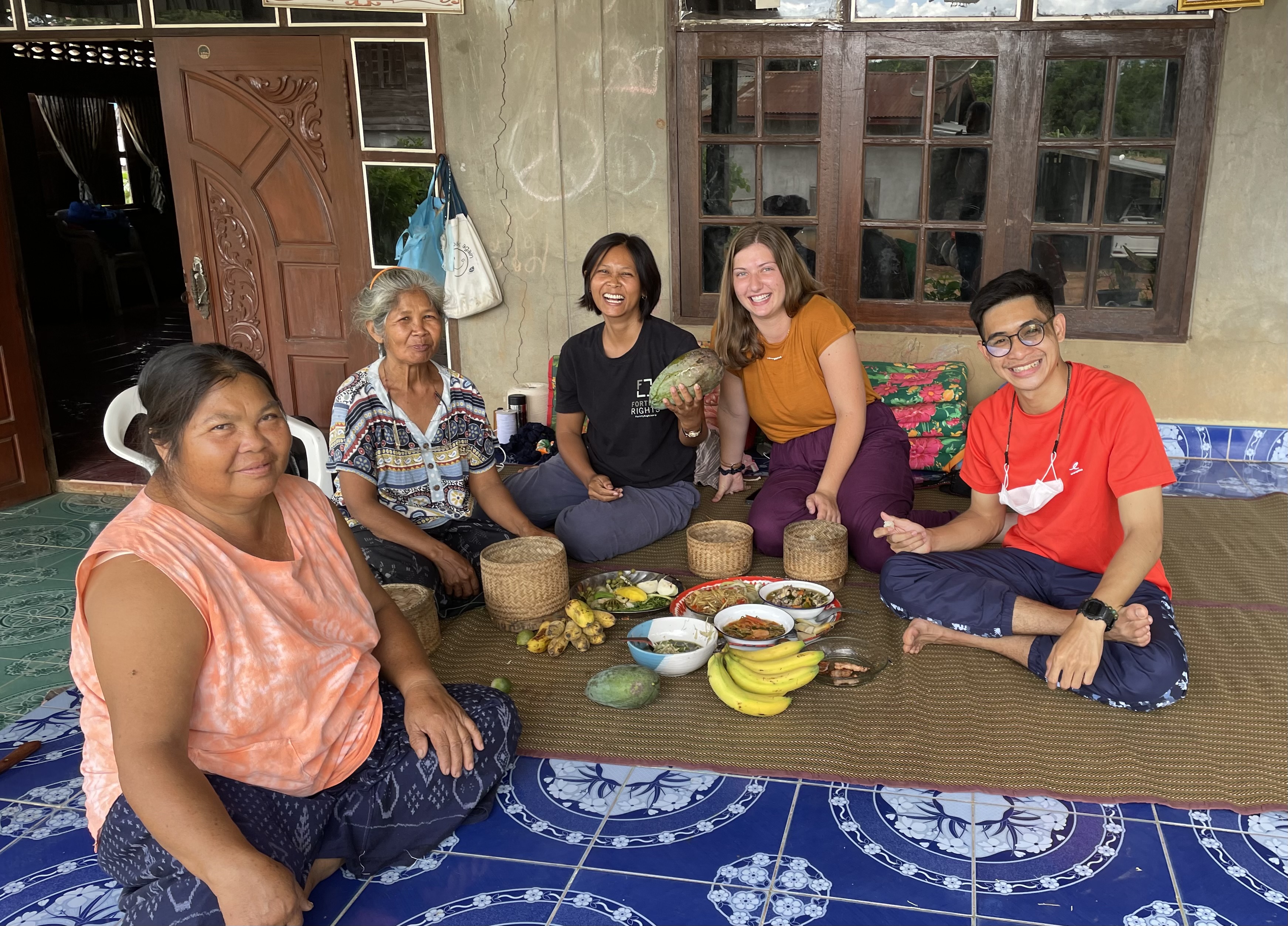Curling is one of the members of the graduating class to be featured on Today at Elon as a "profile of resilience" for her ability to adapt and succeed in the face of the global COVID-19 pandemic.
Megan Curling landed at the Bangkok airport on June 1, 2022, knowing one of the first people she would text — Associate Professor of Journalism Glenn Scott.
Scott had been a mentor to Curling since her sophomore year at Elon. He had supported her Lumen Prize-funded research plan to embed herself in villages in northern Thailand. The residents there were reeling from the harmful effects on their health from an abandoned gold-mining operation that still leaked toxic chemicals into the groundwater. Hers was a project that could easily have been derailed by the global COVID-19 pandemic, with travel restrictions, health and safety concerns and the widespread uncertainty of what the next month or even week would bring.
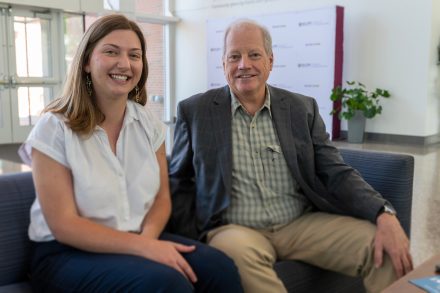
But Curling was determined to return to the country that had left a deep and lasting impact on her during a high school service trip. She was driven to leverage the knowledge she has gained as a public health and journalism major to help improve the plight of these Thai villagers. And now she was beginning her month-long stay in Thailand.
“IT’S HAPPENING!” she excitedly texted Scott, kicking off an experience that combined undergraduate research, study abroad, engaged learning and a commitment to service, all hallmarks of an Elon education.
Curling is a member of the Class of 2023, which arrived on campus in August 2019 preparing to have a “normal” first year of college, only to have the pandemic cause an early departure from campus and a college experience that was disrupted by health and safety protocols, travel restrictions, anxiety about the future, an evolution of the learning environment and constantly changing plans. She is among this year’s graduating seniors to be featured on Today at Elon as “profiles of resilience” for the way they faced the challenges posed by the COVID-19 pandemic and adapted to find meaning and success.
‘I left a part of myself there’
Curling first went to northern Thailand as a high school student who wanted to pair international travel with service. Through an organization called Rustic Pathways, she traveled with other high school students and worked on projects driven by residents. Building a hand-washing station at an elementary school in one village. Adding a bathroom and septic tank at a temple to support the local monk. Building a stage at a primary school that would host performances for the local community.
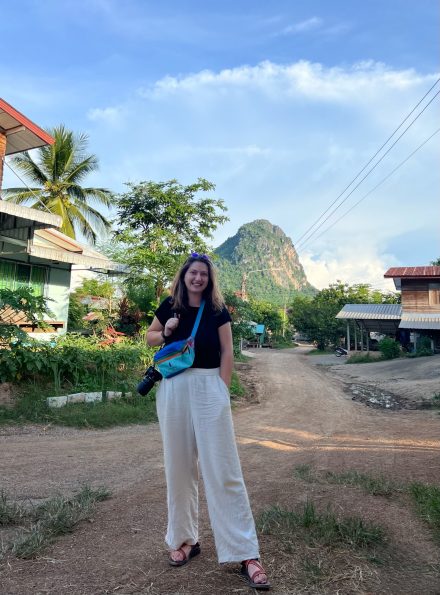
She sought out the experience after a trip to Europe that left her wanting more. “I had the travel bug, but I didn’t feel super-fulfilled by just going and looking at things,” said Curling, who is from Walnut Cove, N.C. “I really wanted to travel more, but in a service capacity.”
The program in Thailand carried the most service hours of any offered by Rustic Pathways, so off Curling went. She and her fellow students were embedded in the communities, staying and connecting with local families. “It just very much felt like I left a part of myself there and I knew I really wanted to go back,” she said.
Elon would provide her with a way. She knew she wanted to study journalism, and joining the Communications Fellows program convinced her Elon was the right choice. Elon’s heavy emphasis on global experiences and the high rate of study away participation was nearly as important. “I knew I could come here and basically go anywhere in the world,” she said.
A Turning Point
Curling was away from Elon’s campus when she remembers first hearing the initial reports about COVID-19. She was in Florida on a Communications Fellows program in January 2020. Even with reports about the rapid spread of the virus, it still seemed distant that early spring. “To me, it felt reminiscent of Ebola in that we were watching it happen somewhere else,” she said.
That was before the virus would come to the U.S., to North Carolina and to Elon. The university would join other institutions that March in sending students home to finish out the semester remotely. It first seemed like an extended spring break, as Curling and others held on to the hope that they would soon return to campus.
During her first semester at Elon, Curling had become involved with LEAF — Lutherans, Episcopalians and Friends — and says it became a home to her. During the summer of 2020, she remained connected with her friends in LEAF through regular Zoom calls organized by Associate Chaplain Julie Tonnesen. The conversations would frequently turn to how the fall semester might look, and what it would be like to return to Elon and continue learning with new measures in place to reduce face-to-face contact.
“It was after a couple of weeks when it hit me that this is how our community is going to look for a while,” Curling said. “That served as a turning point for me. This wasn’t temporary.”
The Lumen Prize
Sophomore year would provide an opportunity for Curling to redefine and refine her academic focus, and to begin laying the groundwork for her return to Thailand.
She had arrived at Elon thinking that she would have a combined focus on journalism and religion, but a public health studies class in fall 2020 would change that. She had initially enrolled in the class because of a general interest in the topic, but before the class concluded, she had added public health studies as a major.
At Elon, the Public Health Studies program offers the opportunity to study abroad through a practicum in India held during Winter Term. That is, if there’s not a global pandemic underway. Curling had been accepted to the practicum in January 2021, but it was canceled due to COVID-19 rates and their impact on international travel. She was accepted a second time in January 2022, but COVID-19 rates in India at the time meant the practicum was one of just a few study abroad programs canceled that Winter Term.
Both cancelations were disappointing, but Curling’s main focus was on her junior year, and how she could weave research abroad in Thailand into her major. It was during her sophomore year that she learned about the Lumen Prize, Elon’s top undergraduate research prize, and the critical role it could play in achieving her goals. As a Lumen Scholar, Curling could receive $20,000 to support her research and academic goals, including an extensive study abroad experience.
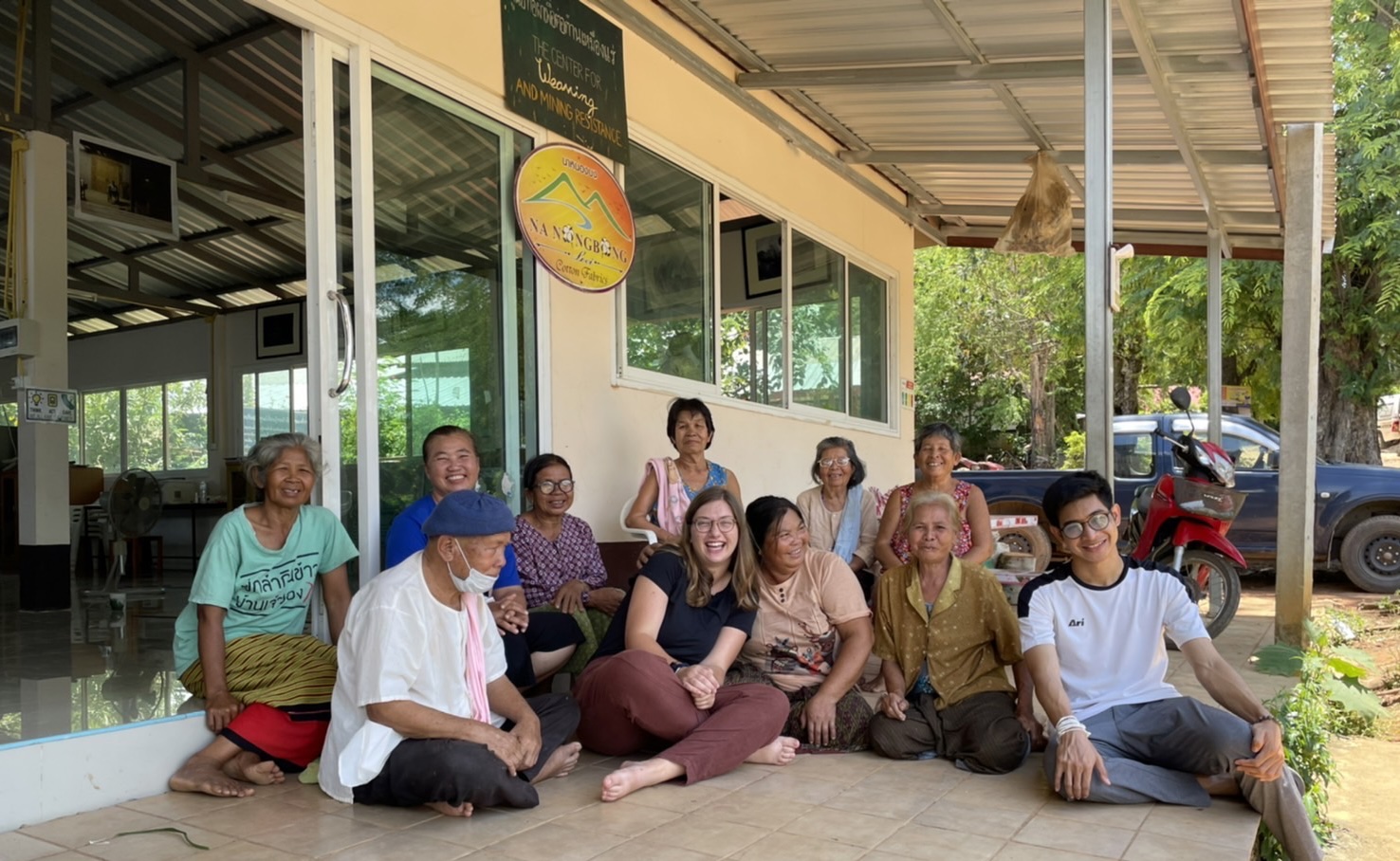
Turning to one of the group leaders from her Rustic Pathways experience, Curling learned about the Radical Grandma Collective, an international organization that supports environmental justice efforts in northeast Thailand. Through the collective, Curling learned about how gold-mining operations had impacted local villages such as Na Nong Bong, and the work of local activists there to seek reparations to help address the devastating health impact of mining.
After the first day of a reporting class with Scott, Curling walked up to him and asked if he would serve as her Lumen Prize mentor for the next two years. Scott has experience with international reporting that would prove valuable to Curling as she undertook her research, assuming she could secure selection as a Lumen Scholar. “We were standing there, and he said, ‘Absolutely.’ He jumped in with both feet from the moment I asked him to be my mentor,” Curling recalls. “I just kind of set my mind to the fact that I was going, and thankfully I got the Lumen Prize, and that made it a lot more tangible and possible.”
Scott says he was impressed by Curling’s determination to return to Thailand and her drive to help tell the story of those suffering from the effects of the mining operation. He saw in her a dedication to helping people improve their lives. “She had never given up on this notion that she would go back,” Scott said. “It was an indisputable truth to her that she was going to get there one way or another. And she would go on to meet all these people and interview them and write stories about them — and help them.”
Zoom connections
Curling began laying the groundwork for her research and her time in Thailand during a period when travel to the country was not possible due to health and safety restrictions. Interestingly, it was a tool made popular by the pandemic that would help pave the way for her to build a strong connection with those whose stories she wanted to tell.
Video conferencing boomed as people physically isolated themselves and students moved to remote learning, as nearly everyone became as familiar with platforms like Zoom, Skype or Microsoft Teams as they were with their cell phones. The ease of use and the ability to freely connect with others around the globe provided Curling with the chance to build more personal connections with villagers, including those involved with the Radical Grandma Collective.
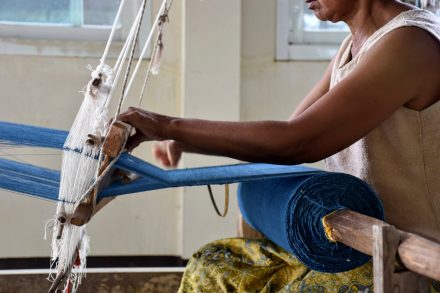
Curling had to overcome some hesitation on the part of leaders with the collective because of bad experiences in the past with other foreigners who came to research the problems from the gold mine. Too many times researchers had parachuted in, made claims about using their research to assist the villagers, and then never followed through on those promises.
Curling took that to heart, and with Zoom, she established a rapport with Becky Goncharoff, the collective’s executive director and co-founder. Their regular Zoom calls as Curling began her research conveyed her sincerity and her desire to do no harm to the communities. It was a relationship that wouldn’t have grown so quickly over the phone or by email.
Soon Goncharoff was setting up a time in the village of Na Nong Bong when leaders from the community could stop by and begin to talk with Curling by Zoom and learn about her work. They began to get to know Curling, and she began to hear their stories, even though she was still halfway around the world. “If we hadn’t been able to do that, and I had come to Thailand blind, I would not have had as smooth a transition,” Curling said. “It helped me build connects a lot sooner and a lot stronger.”
‘It’s Happening!’
At the same time, Curling was working out the logistics that come with international fieldwork. Elon does not offer a regular study abroad program in Thailand, but the university could provide Curling with the tools, support and freedom to build her own research program.
“She is so resourceful,” Scott said. “She never lost her eagerness to make this happen. Every delay has just been something she has to wait out, figure out or create a new pathway for. She has that great capacity to lead her own adventure.”
Curling describes Scott as her biggest cheerleader and someone who never doubted that she could do what she wanted to do. Though he didn’t have a background in public health and wasn’t an expert on Thailand, his support and mentorship through her work were valuable. “Some people may have been better mentors on paper, but the relationship we’ve created and the genuine friendship we have has meant so much to me,” she said. “That level of confidence from him made me more confident in myself.”
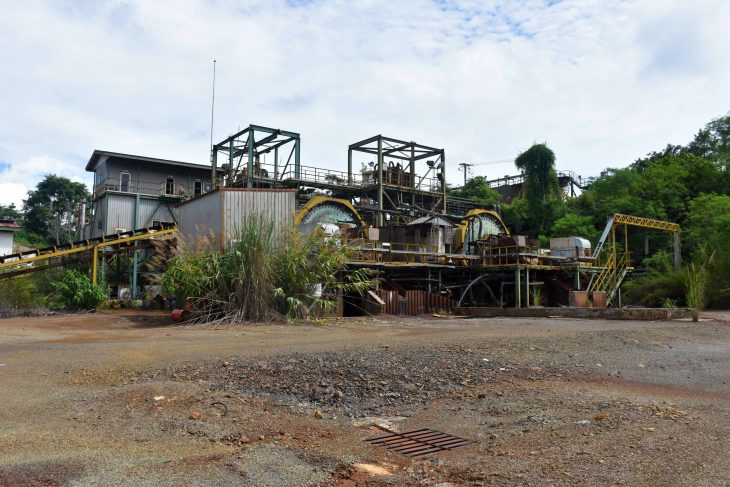
But heading into the spring in 2022, travel to Thailand from the United States was still not possible because of restrictions. Curling began building a Plan B that would involve traveling to a community in Louisiana that was suffering health problems due to a mining operation there. It would tackle some of the issues central to her research in Thailand, but it would not be the same.
By April, she had set the dates for her trip to Thailand at a time when any visitors to the country were required to quarantine for two weeks upon arrival, a requirement that would cut her time for research nearly in half. Finally in early May Thai officials removed those restrictions. Curling touched down in Bangkok less than a month later. “It clicked once I was in the taxi that I was in Thailand and I was about to do this for the next five weeks,” Curling said. “I was so proud of myself that I had gotten this far.”
Across the next month, she would spend her days talking with villagers with the help of a translator. Many had suffered from temporary vision loss or paralysis, an increased rate of liver disease and other maladies stemming from groundwater contamination. She talked with people who ranged in age from 7 to 82, spending close to an hour with each of these 30 people, including several who were in favor of seeing the mine resume operations. She asked how they organized as a community in response to environmental degradation, what kept them in the area and what continued to motivate them to advocate for change.
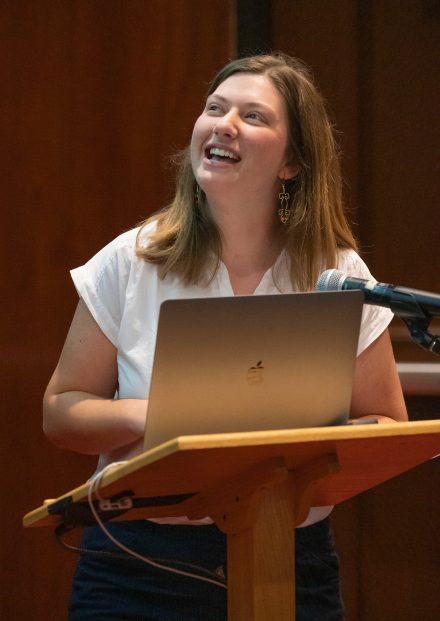
“I was talking to people day in and day out about what was oftentimes the most emotional time of their lives, and that weighed on me a lot heavier than I thought it would,” Curling said. “But I think about it pretty much daily how incredible it is that these three communities trusted me to live with them and tell their story.
Part of her work was taking extensive photographs of the villages and villagers, including one time when she went with the woman who was hosting her in her home as the woman tapped rubber trees in the middle of the night. “For four and a half hours, I just followed her around in the dark and shot pictures of her,” Curling said. “We had no method of communicating with each other verbally, and that was pretty incredible. There was so much respect. There was so much trust.”
Curling would spend much of her senior year processing her work in Thailand and using it as the foundation for articles and research papers. She is seeking publication for her articles by international news outlets, with a focus on Thai-language publications in Southeast Asia. She wants to ensure that the story of the villages she visited becomes more visible to those with the power to order changes. She’s also seeking to publish her research in an academic journal.
“The biggest goal is just to raise awareness on the international level,” Curling told the audience when presenting her research at the Spring Undergraduate Research Forum in April. “That was the request from those I talked to. I am most concerned about doing it in a way that honors them.”



